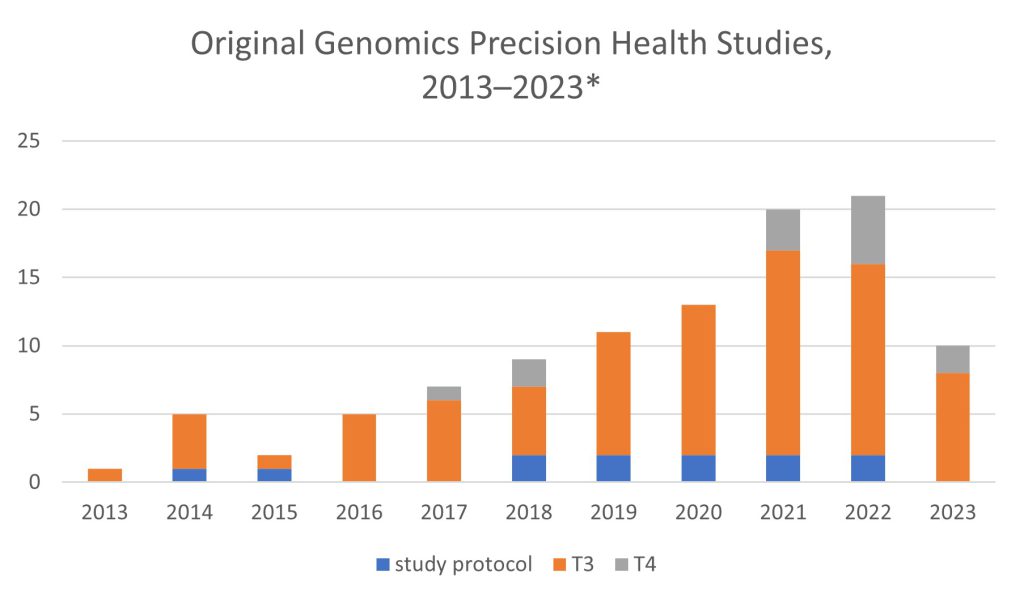Tracking the Contributions of Implementation Science to the Population Health Impact of Genomics and Precision Health: A New Knowledge Base
Posted on bySuccessful implementation of evidence-based genomic and precision health interventions requires an understanding of what works and what doesn’t work within the context of various clinical and public health settings. Research and evaluation that incorporate implementation science tools and methods into the translation of these interventions facilitate this. Here we present a new CDC knowledge base, a collection of these implementation science studies, and a summary of their collective contributions to date.
What is IS-PHGKB?
The Implementation Science Public Health Genomics and Precision Health Knowledge Base (IS-PHGKB) is an online, continuously updated, searchable database of information and publications relevant to the role of implementation science in accelerating the population impact of genomics and precision health applications into practice and programs. The IS-PHGKB is a component database of our overall PHGKB database, which collects information and publications selected by Office of Genomics and Precision Public Health (OGPPH) since 2013 on the translation of genomics and precision health technologies into population health benefits. IS-PHGKB is related to implementation research methods and tools for improving the population health impact of genomic and precision health applications. Implementation science is relevant at the global, national, state, community, and health systems level.
Previous blogs from our office have highlighted the crucial value of implementation science integration in genomics and precision health research. The following is a quick sampler of such blogs over the years.
Scientific publications, guidelines, commentaries, reports, news, and events on genomics and precision health within the IS-PHGKB are identified using implementation science-related search terms of the overall PHGKB database (see appendix below). As of June 7, 2023, most records within IS-PHGKB are classified as Genomics Precision Health (n=241), with fewer classified as Non-Genomics Precision Health (n=63). This can be partially attributed to the fact that the Non-Genomics Precision Health classification was not released until the 7.0 version of the PHGKB in 2021. Additional categories within IS-PHGKB included COVID-19 (n=19), NIH Information (n=11), CDC Information (n=12), Human Genome Epidemiologic Studies (n=4), Pathogen Advanced Molecular Detection (n=3), and Tier-Classified Guidelines (n=2).
Trends in Genomics Implementation Science Original Research
Among the original research articles (n=104) within the Genomics Precision Health classification, most were T3 studies reporting evidence-based guidelines translating into health practice (n=79), with fewer T4 studies evaluating the real-world health outcomes at the population level (n=13), and an additional number of study protocols described (n=12). The Figure below shows these trends over time.
* Data collected through June 7, 2023
** T3 and T4 research are defined in our 2007 paper.
Among implementation studies (n=90), more than a third were not disease specific (n=36). Cancer prevention/risk assessment was the subject of most disease-related applications (n=24), followed by cancer treatment (n=6), prenatal testing (n=5) and newborn screening (n=4), familial hypercholesterolemia (n=4), mental health (n=3), reproductive/fertility (n=3), nephrology (n=2), sickle cell disease (n=1), malignant hyperthermia (n=1), and Angelman syndrome (n=1). Genomic applications related to pharmacogenomics (16), family health history (n=13), and cascade testing (n=4) were included. Studies identified as having evidence-based guidelines classified as Tier 1 included hereditary cancer (n=12) and familial hypercholesterolemia (n=4).
The focus of some studies (n=38) was pre-implementation strategies, including assessing for readiness and identification of barriers and facilitators and outreach through interviews, and surveys of various clinicians, administrators, patients, and other population samples. Implementation science, focusing on understanding how and why the implementation of an intervention is successful or unsuccessful, was assessed in many of the studies (n=52). Implementation science frameworks, models, and/or theories were used in more than half of the studies (n=46).
Going Forward
In summary, we hope that clinical and public health researchers can use the IS-PHGKB to quickly retrieve scientific publications, guidelines, commentaries, reports, news, and events on genomics and precision health at the intersection of implementation science. IS-PHGKB can be a valuable tool to follow the progress and impact of genomics and precision health applications. As we are seeing an upward trend of original studies over time, we expect the contributions of IS to the success of genomics and precision health will increase in the next few years. We will continue to improve upon this database and track important topics and tools for implementation of genomics and precision public health.
Appendix
Search terms used to identify relevant records
- “implementation science”
- “implementation research”
- “implementation strategies”
- “implementation strategy”
- “implementation framework”
- “implementation model”
- “implementation theory”
- “implementation effectiveness”
- “implementation fidelity”
- “Consolidated Framework Implementation Research” or CFIR
- “diffusion of innovation”
- “Theoretical Domains Framework”
Posted on by



